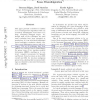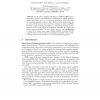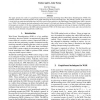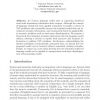366 search results - page 17 / 74 » Subjectivity Word Sense Disambiguation |
111
click to vote
ACL
1997
15 years 3 months ago
1997
This paper presents a method to combine a set of unsupervised algorithms that can accurately disambiguate word senses in a large, completely untagged corpus. Although most of the ...
CORR
2000
Springer
15 years 1 months ago
2000
Springer
In this paper Schapire and Singer's AdaBoost.MH boosting algorithm is applied to the Word Sense Disambiguation (WSD) problem. Initial experiments on a set of 15 selected polys...
LREC
2008
15 years 3 months ago
2008
This paper presents the results of a graph-based method for performing knowledge-based Word Sense Disambiguation (WSD). The technique exploits the structural properties of the gra...
116
click to vote
CICLING
2008
Springer
15 years 3 months ago
2008
Springer
An N-gram language model aims at capturing statistical word order dependency information from corpora. Although the concept of language models has been applied extensively to handl...
128
click to vote
COLING
2002
15 years 1 months ago
2002
In this paper, a supervised learning system of word sense disambiguation is presented. It is based on conditional maximum entropy models. This system acquires the linguistic knowl...




